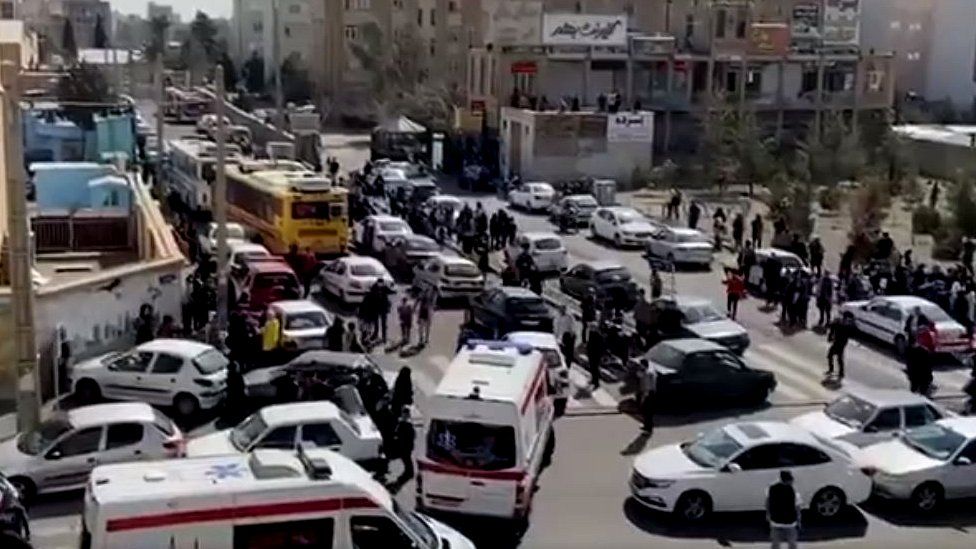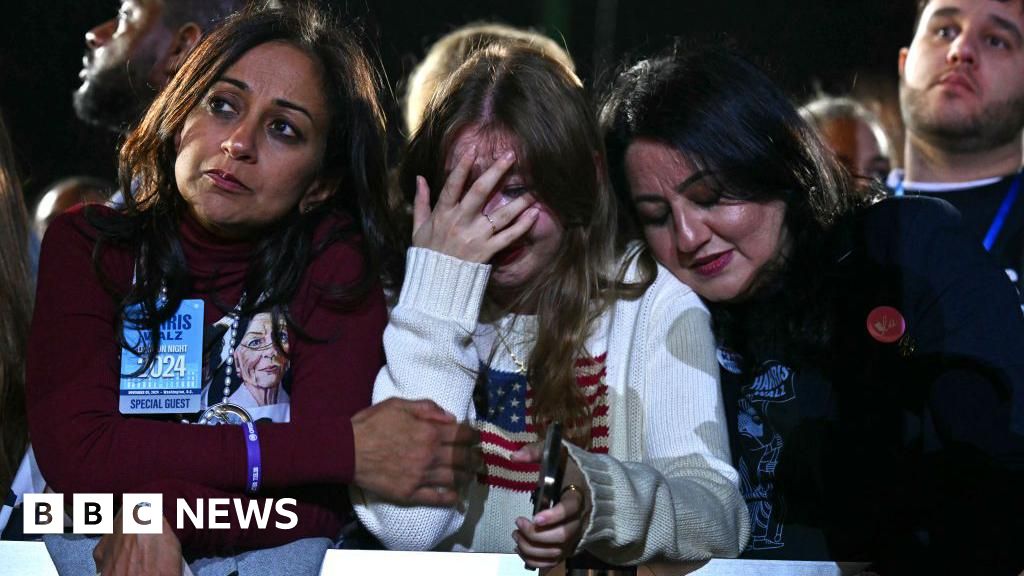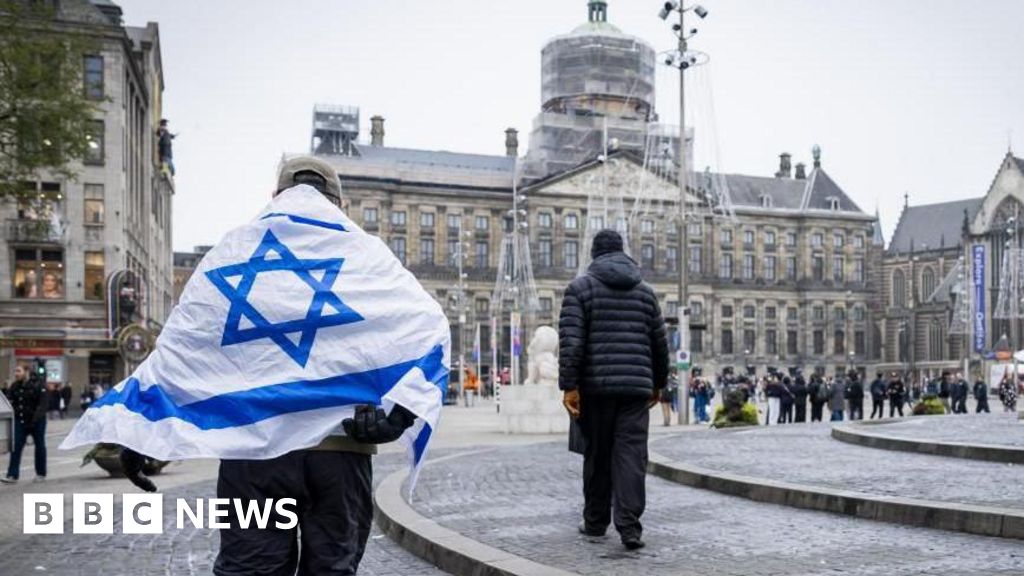ARTICLE AD BOX
 Image source, 1500tasvir
Image source, 1500tasvir
Parents rushed to a school in Tehran to pick up their children, as ambulances waited outside
By Maryam Afshang & Feranak Amidi
BBC World Service
Dozens of girls from 26 schools in Iran are reportedly being treated for poisoning at hospitals after another wave of apparent toxic gas attacks.
More than 1,000 students have been affected since November. They have suffered respiratory problems, nausea, dizziness and fatigue.
Many Iranians suspect the poisonings are a deliberate attempt to force girls' schools to close.
But the government has not said whether it believes they are premeditated.
Interior Minister Ahmad Vahidi, who has been tasked by the president with finding the "root cause" of the poisonings, on Wednesday dismissed as "false" a report by Fars news agency that three people had been arrested.
He also accused foreign-based and "mercenary groups" of taking advantage of the situation to wage psychological war and worry people.
Some pupils and parents suggested that schoolgirls may have been targeted for taking part in recent anti-government protests.
At least 26 schools in five cities across Iran were affected by the latest gas poisonings, local media and activists said.
BBC Persian verified videos showing ambulances arriving at schools and students being treated in hospitals in the capital Tehran, the north-western city of Ardabil and the western city of Kermanshah.
In one from Tehransar, in western Tehran, several girls purportedly from 13 Aban School are seen lying on beds in a hospital ward and receiving oxygen.
Another video from the city's east shows girls sitting on the pavement outside a primary school. A mother is then seen rushing up to the gate and screaming: "Where is my child?" A man replies: "They've poisoned the students with gas."
Primary schools have been among those targeted in the apparent attacks
Authorities are under increasing pressure from the public to stop the poisonings, which were initially concentrated in the Shia Muslim holy city of Qom, south of Tehran.
Research by BBC Persian established that at least 830 students, mostly schoolgirls, had been poisoned as of Sunday, while a member of parliament put the figure at 1,200 in Qom and the western city of Borujerd alone as of Tuesday.
Those affected have reported the smell of tangerine or rotten fish before falling ill.
The chairman of the parliamentary education committee, Alireza Monadi-Sefidan, was quoted by Fars as saying on Tuesday that an investigation had found that the toxic gas contained nitrogen.
However, the interior minister told reporters on Wednesday that reports saying a specific chemical substance had been detected were incorrect.
One parent told the BBC that girls at their daughter's school in the Tehran suburb of Pardis were poisoned on Tuesday.
"My daughter and two of her friends say they heard something like an explosion and immediately afterwards an unpleasant smell - something like burned plastic filled the air," said the parent, who the BBC is not identifying for safety reasons.
"They were asked to leave the class and go into the yard. Many of the students started collapsing in the yard. There are kids with asthma and heart problems in my daughter's class."
"Ambulances and the police arrived. Kids were given milk by the ambulance staff."
On Sunday, Deputy Health Minister Younes Panahi said it was "evident that some people wanted all schools, especially girls' schools, to be closed down", although he later said that his remarks had been misunderstood.
Some people have speculated that the schoolgirls are being targeted as "payback" for their role in the mass protests that erupted in September after the death in custody of, Mahsa Amini, a young woman who was detained by morality police for allegedly failing to wear her headscarf "properly".
Authorities have portrayed the protests as "riots" and responded with lethal force. Human rights groups have reported that hundreds of protesters have been killed, among them dozens of children.
Poisonings have been reported across the country, including in the north-western city of Ardabil
In another video posted online on Wednesday, a woman is heard saying that girls at a primary school in Kermanshah had told her that they heard an explosion, and that their headteacher then announced that some students were unwell and ambulances were being called.
The woman then talks to a young girl, who wonders whether they were "chosen" because they had taken part in the protests.
Public anger at the poisonings and the authorities' response have prompted fresh unrest.
A second video from Tehransar on Wednesday showed a group of girls outside 13 Aban School shouting "Woman, life, freedom" - the main slogan of the protest movement - as well as "Death to the child-killing government."
The parent from Pardis said: "We arrived at the school, angry and worried. Parents started shouting slogans against [Supreme Leader Ayatollah Ali] Khamenei."
"Nobody believes they will investigate these attacks," they added. "I have no hope in the system. But I hope the world will hear our voice and stop supporting these child killers."
Officials reported that 35 students from their daughter's school were taken to hospital after the poisoning. But the parent said the actual number was much higher.
"From my conversations with parents and the school principal, half of the students were taken to hospitals. That is at least 200 students."
One of those children was in a coma, they said, adding: "Some parents have also refused to take their children to hospital because they are afraid and don't trust the officials."

 1 year ago
20
1 year ago
20








 English (US)
English (US)